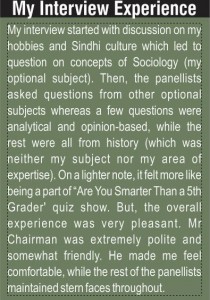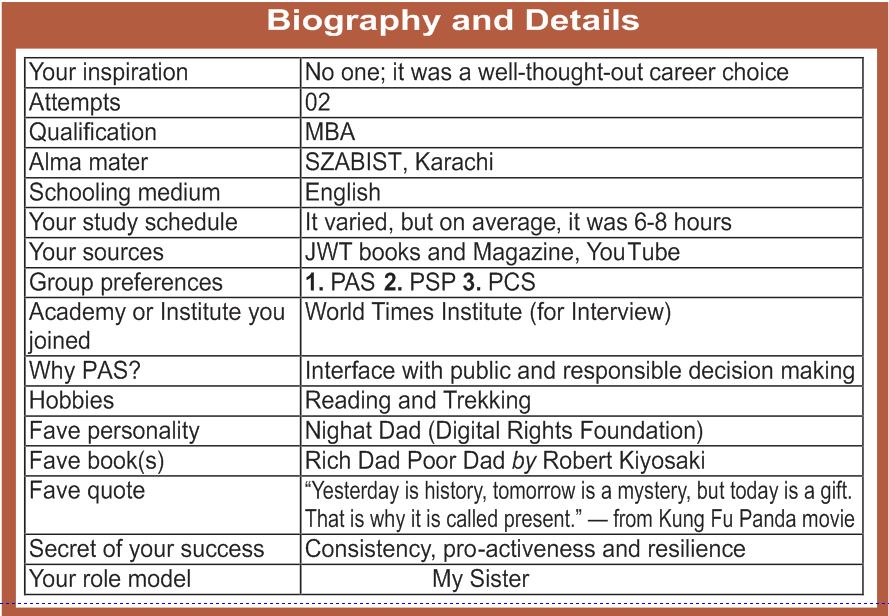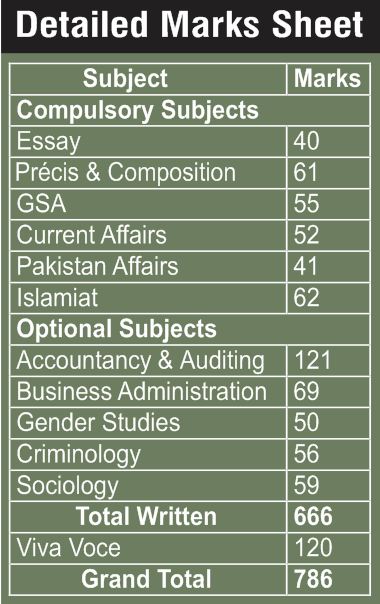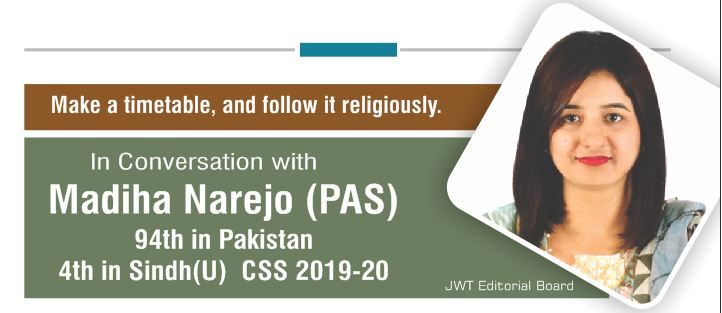In Conversation with
Madiha Narejo (PAS)
94th in Pakistan 4th in Sindh(U) CSS 2019-20
Jahangir’s World Times (JWT): First of all, please tell us about your educational background?
Madiha Narejo (MN): I am a business graduate; I have done both my BBA and MBA from SZABIST, Karachi, with majors in Marketing. I made it to the Dean’s Honor List, in my MBA. Before going for CSS, I had a 3-year work experience in corporate sector.
JWT: Since you have been allocated to Pakistan Administrative Service (PAS), what was the feature of this service that attracted you most?
MN: PAS is an all-Pakistan service which means that one gets to serve across the country in different capacities. This gives an officer a dynamic exposure to societal ground realities. Moreover, I like meeting and interacting with people. Public dealing is an essential part of PAS and this is what attracted me most as it suits my personality.
 JWT: How much helpful did you find Jahangir’s World Times (JWT) during your preparation for CSS exam?
JWT: How much helpful did you find Jahangir’s World Times (JWT) during your preparation for CSS exam?
MN: Jahangir’s World Times was very helpful with all the current affairs and general knowledge articles. It helped me to have an insight into events happening across the world. The components of JWT were useful for overall guidance and motivation. Also, the JWT books for optional subjects were very helpful as they are a one-stop source for the whole syllabus.

JWT: Generally, compulsory subjects are considered low-scoring, what was your strategy to get through these very papers?
MN: The score in written part depends on the quality of your material that you must present in legible form and with proper analysis on the issues asked in questions. Authentic references, too, make a difference. Sticking to what is relevant than merely filling up sheets is also another thing to be kept in mind. Consulting one quality book that covers most part of the syllabus and preparing remaining topics from repeated questions of past papers should be the strategy for effective and timely preparation.

JWT: How answers should be written to get maximum marks?
MN: I think it is important that you fully understand the question before answering that. Read the question a couple of times to be sure about what is being asked. Then divide the question into all the areas that are to be addressed, proceed with jotting down ideas on rough sheet, and decide on the order of the answer. Use of relevant examples and references will be very helpful.
JWT: Should there be some word limit kept in mind while writing answers?
MN: Quality vs. Quantity is a never-ending debate. But, in my opinion, quality is always more important while keeping in mind quantity as well. As long as you write, on average, 5-6 pages, with quality material, you are good to go.
 JWT: How did you structure your Essay and what was your strategy for Précis and Composition Paper?
JWT: How did you structure your Essay and what was your strategy for Précis and Composition Paper?
MN: The foremost step in ensuring that you will pass the exam is choosing the right topic. I have seen aspirants choosing trickier topics just to leave an impression on the examiner. While that may work for some; for many, it becomes disastrous. I had not prepared any essay topic beforehand; however, I did practice writing full-fledged essays so that I knew the technicalities. I was very clear in my mind that I would choose a very simple and direct topic. I wrote on “Expanding Information Technology: a curse or a blessing.” I chose this topic because it was one of the easiest in paper. I didn’t have to know quotes and stats on the topic, rather I just had to relate it to my surroundings, and validate all my arguments. As I was writing in favour of the topic, it didn’t take me long to come up with so many examples that could justify expanding information technology as a blessing. Along with that, my essay had an indirect introduction and a thesis statement. Each paragraph discussed and proved a single argument, and all the paragraphs were coherent, presenting a smooth flow. In the end, conclusion reiterated that my thesis statement has been proved.
For Précis and Composition, I practiced a lot from past papers and got feedback from my mentor. Also, for the grammar part, I did sentence correction and completion exercises available online, and they came in very handy.
JWT: Generally, compulsory subjects are considered low-scoring, what was your strategy to get through these very papers?
MN: In my opinion, the six compulsory subjects can be divided into 3 categories on the basis of study methodology. To me, Islamic Studies & GSA; Pakistan Affairs & Current Affairs; and both the English papers can be clubbed together. Both Islamic Studies and GSA are very straight subjects; you can pick any of the available books on them and cram your way out. English papers require a lot of practice, you keep a habit of practicing them over the course of time, and these two will not be a big deal. Pakistan Affairs & Current Affairs are actually the two compulsories that are difficult to handle, as the scope of the syllabus for these two is very wide. So it’s very important that you maintain personal notes on important topics and keep updating them as the new events unfold.
JWT: What areas should the new aspirants focus while preparing for the CSS exam?
MN: New aspirants should focus on two major areas: English writing and current affairs.
My Tips:
Selection of optional subjects
It should be a combination of factors. One’s academic background, personal interests, scope of the syllabus and scoring trends should all be put together when choosing an optional subject.
Notes-making
Self-made notes are always better than anything available in the market. Read different materials and reproduce them in your own way. Make notes in either soft copy or in loose sheets so that you can keep adding and updating them till the last moment.
 Jahangir's World Times First Comprehensive Magazine for students/teachers of competitive exams and general readers as well.
Jahangir's World Times First Comprehensive Magazine for students/teachers of competitive exams and general readers as well.



